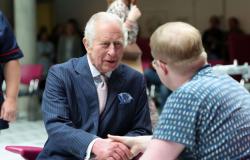“There’s a lot of talk about empathy. I think we’re misinterpreting that word,” says writer, therapist and metal lover Iva Hadj Moussa. In the new book, he talks about people in their fifties cursing the world and strumming guitars.
“Many of the problems of the current world stem from the mistakes of all of us. It’s not just about a certain group,” thinks Iva Hadj Moussa, author of the novel Heavy Souls. His hero is young man Johannes. A divorced, bitter guy with a dodgy past who resolves his midlife crisis by rejoining his youth metal band.
“I think any aging man might consider therapy. If my hero had gotten over it right after his incident, he might have dealt with it much better,” thinks the writer and therapist. But he adds that even returning to his own dreams is a brave step. Especially when it comes to playing in a metal band.
“It releases the emotions that I have built up inside me. Thanks to metal, they can go out,” says Iva Hadj Moussa, who wrote her second novel about metal.
Heavy Souls is your second book about metal. The first one was about teenagers in a metal band. The second one is about people in their fifties who seem to be experiencing a second puberty and have returned to a metal band. We’ll take it one step at a time. What fascinates you so much about metal?
Absolutely everything. I really like listening to metal. It’s a way of relaxation for me. An escape from reality. I love metal concerts, festivals… although I consider myself more of an introvert, the commotion at metal concerts makes me feel good for some reason. I like the metal community. It is very colorful. In culture, metal is a fringe issue, similar to horror movies. I ask myself why I like both so much, why the sharpness and the gloom are so good for me. I think it will release the emotions I have built up inside. Thanks to the metal, they can get out of me.
What fascinates you so much about fifty-year-old guys? Aren’t they actually a bit like that metal? There are also a lot of prejudices…
I touch on prejudices in the book. Those towards guys who walk around in ripped denim vests, have thinning hair… one tends to mock them for being awkward, leading a style that is no longer completely fashionable. What I like about my heroes is that they love metal and live by it. They trust him and through him they find new faith in themselves. He resurrects the band and realizes that maybe they don’t belong to old iron yet, that they can still do something. What must it be like to stand on that stage in front of the crowd and cut into the guitars? It must be an amazing feeling. I wanted to somehow convey it to the heroes.
The main character of Heavy Souls is Johannes. He makes a living as an estate scavenger, suffering from a mid-life crisis. He is divorced, he has a daughter. And he also makes a mistake that is very difficult to forgive. Every time as a reader you think to yourself – he’s quite a nice guy – you remember his mistake.
Johannes is not entirely likable at first glance. Sometimes he even makes speeches that are hard to agree with. His shell from the past – that’s a topic he’s still working on. I was wondering what it’s like to make such a major mistake, how do you deal with it? Who will give him absolution? Surroundings, or must he forgive himself?
We don’t want to reveal too much about what he commits, but it’s an offense that the company is dealing with a lot right now. Are we treating people who commit similar offenses unfairly? Or do they usually get away with it?
They shouldn’t get through it. You can’t say – he’s just a guy, he can’t help it, it’s instincts. I certainly do not agree with this position. On the other hand, even the mistakes we make can drag us down, but we can learn from them. Every person deserves to move on in life after their transgression. If he reflects it, does not repeat the behavior, then he should not be reprehensible for the rest of his life. But it matters a lot how he reacts to his act.
I hope my hero faces his mistake head on. He tends to whine, he feels like he hasn’t done anything that terrible. At the same time, the role of his daughter is important. She sets up a mirror for him.
Iva Hadj Moussa (*1979)
Czech writer. She studied psychology at the Masaryk University in Brno. She made a living as an advertising copywriter, worked in pedagogical consulting services. She wrote books for children and young people, in 2020 she debuted with a novel for adults, Shalina do stationa tuha.
She also published the books Demon from the Housing Estate (2021), Havířovina (2022) or the current Těžké duše (2024).
Photo: Michal Šula, Seznam Zpravy
Writer Iva Hadj Moussa
The guys in your older book, The Housing Demon, put on metal masks because no one can accept them for who they are anyway. What about your metal fifties? Are they resisting prejudices, or are they deliberately recording them?
Maybe by reviving their band they are actually recording for them. Even with the fact that they are no longer as fit as they were in their twenties. They have a lot of doubts, insecurities, they don’t know what it will be like when they stand on stage again. But at the same time, they go all out. They let the world know – take us as we are.
The Heavy Souls guys talk about how they don’t understand the current world. When could they have done their research, discovered that things were more complicated than they appeared from the pub, and when they needed help?
I wondered terribly what could be behind the bitterness and snobbery of my fifty-year-old heroes. Apart from reading a headline in a newspaper and writing a comment on social media or talking about it in a pub. I wondered what was needed under that. Maybe some layer of loneliness or some other feeling that I’m a little bit alone in the world right now. Coincidentally, all those guys are single. When you have no one to share your life with, bitterness towards the world flows from it.
I agree with that. Johannes is easy to like, he is good to his daughter, but sometimes you think he is also a bit of an idiot. Isn’t it your own fault for the loneliness?
I certainly do not excuse him. Yes, I think it started mostly with him and then escalated. He became bitter. It is terribly important for a person who is starting to get angry with the world to have someone younger around them. As Johannes has his daughter. You need someone with a more open mind, someone who confronts him with a different perspective. Johannes behaves like an idiot, but sometimes he surprises with the way he orients himself, that sometimes he is not so lost in the world. It may require some work on the part of the reader. I would like my book to provoke readers to say: maybe I don’t have to see the people around me in such black and white terms. We all carry a cross. Judging is easy. But we should stop judging.
The mistakes of all of us
When did you start saying that you need to write a book about fifty-year-old aging guys? About maybe being a little too strict with them.
Originally I wanted to write a book only about metal. An ode to music. But it had to have some heroes. The longer I wrote, the more I realized that I was writing a book about aging white men, the so-called boomers. The motive not to be so hard on them was not the main intention, but as I was writing it occurred to me that some of us comment on aging white men a little too critically. Some of my acquaintances at this age say: I feel that I am responsible for all the evil in the world. They think the world puts too much blame on them. It struck me as an interesting perspective, and I wanted to explore it a little more closely.
What do you think the boomers are really wronged about?
I think that a lot of the problems of the current world somehow stem from the mistakes of all of us. It’s not just about a certain group. We can’t listen to anyone. Empathy is often talked about. But it seems to me that we interpret the word differently than I interpret it.
I sometimes feel that we only empathize with people we agree with. Empathy should be helpful even towards people with whom I disagree. I’m just trying to understand their world view. Even people who say they are tolerant and respectful often practice it only in their group. And the bubbles then separate from each other.
It is stereotyping that boomers are supposed to represent the conscience of the world. On the other hand, it is a demographic that has been in power for a long time. He benefits from it and bears responsibility for his power.
It’s pretty much as you say. I don’t like to generalize, but white men really do rule the world in some way, and not always with the best intentions, whether we’re talking about ruthless plundering of the planet or some kind of physical superiority. When I walk down a lonely street alone at night, I will always be more afraid of a man than a woman. Whoever reads or listens to this now is probably thinking – that’s not fair, I would never hurt a woman. If you look at the statistics, it really is mostly men who hurt and rape. It’s really not fair to say that about all men. It’s not fair to you.
You are a trained therapist. Have you ever offered therapy to the group of men you write about in your book?
I’m more into kids. I think it is needed. There are quite a few experts. That was one of the reasons why I returned to therapy. I am still curious about the reaction to the book. I already have a few and they are generally positive, although I have already encountered a few along the lines of what can I, as a woman, know about aging white men? Moreover, about life in the Czech Republic? They were probably referring to my name.
But since we’re on the topic of therapy – I don’t want to lecture or moralize anyone, but I think some aging men might consider it. Share your concerns with an expert or someone who can guide you through a difficult period.
Maybe if Johannes had gone to therapy after his incident, he might have handled it a lot better. Or if he did after the divorce. He has hidden, unhealed wounds that therapy can greatly help.
On the other hand – he actually found his own way of therapy. He said to himself: I will do something with my life. He rebuilt the band again. It’s very good when you say to yourself – I’m not just a victim. I’m not just a bitter guy who will scream at the clouds forever. I’ll try to do something else. There is some hope in this.
Cultural conversations
The head of the Seznam Zpráv culture column, Jonáš Zbořil, talks to people who cannot live without culture. Listen Interviews by Jonáš Zborila here, or check out a selection of the best interviews from the past year below.







